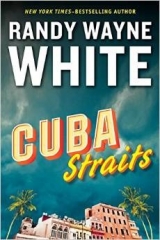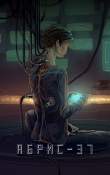
Текст книги "Cuba Straits"
Автор книги: Randy Wayne White
Жанры:
Политические детективы
,сообщить о нарушении
Текущая страница: 6 (всего у книги 17 страниц)
“Sorry I doubted you.”
“No, is good you want this defector so strongly. I see this in you even after so much stupid coward shit you do last night. But”—Kostikov pushed closer—“I think you be fast at learning this trade. You would like?”
Had the Russian attempted a fatherly tone?
“Yeah,” Vernum replied, “I’ll do whatever it takes, man.”
“Oh?”
“An opportunity to serve my country, of course.”
“A patriot, eh?” The Russian’s tone said Bullshit. “I am told you are criminal. A deviant who buys girls with opium of religion. As patriot, you have read Karl Marx, yes?”
“Uh . . . I’d have to think back. What do you mean?”
“God, all your gods, are shit. That was truth Comrade Marx wrote. Your Santería is more shit than even Papist shit.”
Vernum thought, Dude, you are playing with fire, but changed his approach. “Man, you’d have to experience where I live. It’s all dirt roads and oxcarts, the same tired village women every goddamn day. So I—”
“Your women are superstitious fools,” the Russian said. “They fear stupid fears—even a devil in the cane fields, I hear. Is true?”
Vernum shrugged, thinking, Uh-oh.
“Your DGI say some hide their children, or defect on rafts, because of you. See? Religion total shit. Is large difference between devils and a man who is deviant, huh?”
That question, in an odd way, disapproved of superstition but not deviants. Vernum felt a tad better. “As long as you understand what I’m dealing with. Think what you want, but, as a respected Santero, I’ve gotta, well”—he risked a man-to-man wink—“restrain my interests in things that Havana, Key West—name any city—can offer men like us.”
Two bloodshot eyes stared through him, then swiveled toward the blonde or the pilot, who wore a headset and was also smoking. The Russian looked out the window—blue ocean a mile below—then asked, “You have phone with camera?”
DGI agents had given Vernum a cheap one, but what did that have to do with anything?
The Russian used a finger to wag him closer, then leaned his nose an inch from Vernum’s face. “No more your coward bullshit. I give order, you obey. I say truth, you obey. You want learn trade, you obey. Is clear?”
This was more than Kostikov had spoken in three days. “Sure . . . yeah, never question your orders. Damn clear . . . comrade.”
“Come. I want you take video.” The plane listed slightly when the Russian stood and he pulled himself seat to seat past the German blonde to the pilot, who he tapped on the shoulder, the pilot not surprised, more like I’m ready when you are, sir. Then put out his cigarette and fastened his shoulder harness.
Vernum, standing in the aisle with his phone ready, noticed and thought, We’re either landing or he’s trying to scare the shit out of me.
He looked out the window—nothing but water down there, José Martí International still twenty minutes away.
The Russian turned and spoke to the blonde, not loud enough to hear but congenial in manner. The blonde had been subdued but suddenly smiled and said, with her grating accent, “Yah. I have camera. Anything, comrade, for you.” Unsnapped her seat belt and stood, the cigarette in her mouth, and dangled her white breasts when she leaned to dig through her purse.
Why did Kostikov need both of their cameras?
Vernum thought, Fat pig, he’s screwing with me, and was sure of it when the Russian laced a wrist through some cargo netting near the door and ordered, “Come, hit video button. You ready?”
It was the way Kostikov grinned that warned what was coming—his assassin’s grin from the KGB video—but Vernum was so goddamn scared, he crept a few seats closer anyway and watched it happen through the viewfinder.
Kostikov saying to the blonde, “Ah . . . such beauty, your necklace,” which she took as a compliment to her tits. She smiled, aiming her camera, but used a free hand to tease her blouse open, just a flash of nipple, before scolding him, “You are very, very bad man.”
That grin again. “Yah. Bad.” Kostikov reached as if to touch her tits but ripped the necklace off.
The way the blonde’s face paled, from sunburned to dead white, Vernum found himself breathing heavier, hungry, very hungry, the demon inside him demanding to be fed. He called to the Russian, “Wait . . . let me change angles,” and ducked in two rows behind the woman, swung his legs over an armrest for a better view, which Kostikov confirmed, before he forced the door open and lifted the woman by her hair while wind roared, debris scattering as if they’d flown into a sandstorm.
“Don’t stop,” the Russian ordered, “use camera!”
Vernum, deafened by the noise, realized those orders were for the blonde, who already looked dead, her eyes so wide and still, but rallied and did exactly as she’d been told while Kostikov looked into her lens and spoke Russian as if addressing future KGB agents.
“Obey always me,” he told the woman. “Keep doing.”
Hopeful, the expression on her face until he swung her out the door, held her there while the airstream ripped at her clothing, but, by god, she didn’t drop that phone.
Vernum thought, I would marry her, and then leaped to his feet when the Russian signaled Come closer.
“How’s this?”
“Nyet, coward, here.”
Mother of hell, this was a test, he realized, and so far only the blonde was passing. He shuffled his feet, video rolling, while he brachiated from seat to seat. The opening was no wider than Vernum’s shoulders, but a universe of screaming reality out there when he was at the door. A mile down, miles above, nothing but blue.
“Is angle good?” The assassin showing his artistic side while the blonde clawed at his wrist, her shoes gone, her blouse shredding like a flag.
Through the viewfinder, Vernum managed eye contact with the woman and fell in love with her face, a perfect blend of horror and pain that fired his deepest needs within. I would give anything, he thought, to trade places with that pig. Why isn’t he laughing?
Kostikov was more concerned with his lesson for today. Yelled a phrase of Russian at the lens, barked something else to the woman, his manner stern, and that was it—he dropped her with a Good riddance swipe of the hands, didn’t even watch her body rocket downward, tumbling, although Vernum captured it on HDV.
My god. Ecstasy. Even without reviewing footage, he knew this was something he would watch over and over a thousand times, at night, alone—or with that right special someone just before he ate her soul.
• • •
“SECRECY,” THE RUSSIAN SAID when they were seated again, “is first rule of importance. Here, I show you.” A satellite phone was produced. On it a Facebook photo: the scarecrow hippie and two female German agents, all naked, but only one of them wearing the KGB necklace that now dangled from Kostikov’s pocket.
Vernum, for a change, spoke with respect. “Comrade, this is the work I have searched for all my life. Please give me another chance to—”
“Shut your talk” was the reply. “Obey orders, that second rule of importance. Tell truth to superiors, that third.” The Russian was slow on his feet, but his hand grabbed Vernum’s chin before he could react. Pulled him across the aisle until they were nose to nose. “Fourth rule: I am your only superior. Is clear?”
Yes.
“Above all others.”
Oh, yes!
“Is true you are sex deviant?”
A trick question. Vernum was screwed either way, so he tried a broader truth. “I like . . . killing.”
“Good.”
Really?
Yes, the Russian approved. “Is okay with women or girls, even boys. Bugger ten dead goats, what I care? But do not lie to Kostikov.” A pause. “I tell you something—just us. Your DGI agents are idiots. Your government is shit. What you think of that?”
Vernum could only nod.
“I tell you use device or take gun, shoot all Cuban generals, what then?”
“Follow orders, comrade” was the correct response.
The Russian released him. “Okay. I want briefcase. Just me. Same with defector of name Casanova. Just me. You will help.”
Vernum, close enough to smell the man’s breath, said, “Of course,” but had to wonder, Is this another test?
“In DGI debrief, you will confirm whatever I say. No mention of German whore”—the man was fishing something from his pocket—“or video that you now make for me copy. What this called in Spanish?”
“A memory stick,” Vernum replied. He glanced forward and, for the first time, realized their pilot was Russian. My god, it was true, he was being recruited by the KGB. “Right away,” he said. “I’ll make a copy before we land, then delete it from my phone.”
Smart—that was Kostikov’s reaction. He appeared to relax a little, settled back and gave Vernum permission to watch the footage first.
Hunched over his phone, hunger is what he felt.
“You enjoy?”
Oh my god, yes. Twice he played it, always pausing when the blonde made eye contact, and knew he could never bring himself to delete the footage.
Kostikov sat back, hands laced behind his head. Taking it easy now that the job was done. “Is important to have hobby. Like me. I have hobby.”
Vernum’s attention zoomed. “More videos like this?”
“No, a hobby is for amusement. That is question I have for you. About your village, I hear story of time before Fidel. You know this story? I think was 1958.”
Even now, speaking Fidel’s name was dangerous, but that isn’t why Vernum evaded. “A story about . . . ?”
“Motorcycles,” the Russian said. “Do you know story?”
Vernum was too frightened not to tell the truth. “I do. Three Harley-Davidsons. I know where they’re hidden, but not exactly where. But that traitor Figgy Casanova, he knows.”
The Russian’s tongue circled his lips. “Story contains stupid game, baseball. Three fascists during Cold War—”
That’s as far as he got. The man burped, touched a hand to his belly, and his thoughts turned inward while jerked chicken filled the air. Burped again, looked out the window. “Must shit,” he muttered and called something to the pilot that might have been Hurry up and land.

Ford topped his tanks at the Chevron pier, Key West, and was south of Sand Key Light when the electronics suite bonged with a special alert to mariners. Alerts weren’t rare, but this one was synched to his GPS, so he paid attention.
Between 13:30 and 14:00 hours EST, the U.S. Coast Guard received three reports of near collisions with a cruise ship or freighter, registry unknown, and one report of debris, possibly from a raft or sailing vessel but unconfirmed. Conditions: light to medium fog, seas near calm. Coast Guard has dispatched assets to investigate. Advise all vessels in shipping lanes south of Key West to be on alert . . .
Exact GPS coordinates followed.
Ford considered how this might impact his crossing. He didn’t want to be seen by the Coast Guard, especially in international waters. On the positive side, cutters and helicopters were likely to collect in one small search area.
A stroke of luck, he decided.
Even in fog, collisions at sea were uncommon, but only because the sea is so damn big. A rogue freighter, is what it sounded like, one of those mega-ton robots with a sloppy crew who didn’t bother to stand watch when on autopilot. Ford pictured a raft full of refugees, or novices in a sailboat screaming, waving their arms to get the attention of an empty helm while the monster plowed them down.
Tomlinson was too good a sailor not to stay on his toes in the shipping lanes.
It was nearly three-thirty—15:30 hours. Ford switched his radar to a wider grid and steered a 230 heading, which was his best guess at the line Tomlinson would plot to Havana, or Marina Hemingway, fifteen miles west.
His friend hadn’t shared particulars. This was another guess. But he had told Ford why he was sailing to Cuba: A woman’s love letters are sacred, so I’m going to return them.
That simple, but only because Ford had condensed his pal’s diatribe into a simple declarative sentence. Tomlinson was a romantic idealist, ruled by emotion yet smart enough to rationalize even the dumbest of choices. Less so in this case, but seldom so passionate. He had used phrases such as Internet flesh peddlers, political ping-pong gawkers, and soul merchants. The moral imperative, he’d said, trumped all: we have a duty to right wrongs if it is within our power. “I don’t give two hoots in hell who wrote the letters, the sentiments belong to only one heart, a woman’s heart. Those letters are her last linkage, for christ’s sake, to the days when she was young and full of hope. Screw world voyeurism, man. I want to strike a blow for human privacy.”
The grand gesture. Tomlinson seldom missed an opportunity, although, in this case, nostalgia and his leftist idealism probably played a role.
Ford had made the mistake of asking, “What if Castro’s mistress is dead?”
That mystic journey could not be summarized in a sentence.
Ahead were clouds separated by miles of water, the surface lucent, punctuated by coral heads and banks of white sand until the Earth ruptured into canyons below. There, a line of cobalt marked the color change.
“No bottom” was the old mariner’s term.
Flying is how it felt to Ford when he tapped the throttles up to 4000 rpm and let the boat settle into the slow rise and fall of the Florida Straits. He checked gauges—oil, water, fuel, amps—all good. Looked astern—the simplest of safety precautions that amateurs often failed to do. Went through his list while frigate birds searched the sky for thermals: safety harness with EPIRB where it belonged . . . kill switch attached to belt . . . enough water and MREs for a week stowed with emergency gear; tactical mace, a survival knife, and his old Sig P226, plus the mini Sig Sauer he’d taken, along with an ankle holster, from the cable installer. Two hundred rounds of 9mm were in a waterproof sleeve fitted inside the chemical toilet’s flush tank.
Ingenious, the agency that had designed this boat.
For purposes of deception: fishing rods with gold International reels in plain sight, four radar decoy buoys, a false passport, ten thousand in dollars and euros, a field kit that could only belong to a biologist, and a letter of introduction confirming he was doing important research on sea turtles.
The letter was signed with a flourish and the personal seal of Gen. Juan Simón Rivera, former president of Masagua. Even if Ford caught up with No Más and convinced Tomlinson to turn around, he would need the equipment because he’d made up his mind to continue on to Cuba.
Check. Check. Check. Like the pilot of an airliner, he went through the list, stayed busy until he’d reached the equivalent of cruising altitude.
Flying. To Ford, that’s how it felt to point a good boat at the horizon and leave the world behind.
• • •
RADAR SHOWED a gathering of vessels ten miles ahead, close enough that Ford caught glimpses of a Coast Guard cutter’s tower, so he adjusted his course eastward, where clouds descended into the warm Gulf Stream. Rain most likely. Fog was rare this late in the afternoon.
A helicopter appeared, one of the big ones with all the electronics. The best hope of avoiding attention was to steer toward it. He did, maintained course, while the chopper drifted away in a methodical search pattern.
Maybe it was true: a robot ship had hit a smaller vessel and dumped people into the water. It was the sort of diversion he needed, yet his mood took a hit. Poor bastards, he thought. “Good luck.” Said it aloud and meant it. Even on a bright, calm day, the odds of finding a person adrift were not good. In rain or fog? Or if the wind freshened? Forget it. Technology had yet to match the enormity of the open sea.
For no good reason, the image of No Más popped into his head. Earlier, he’d tried to raise Tomlinson on VHF radio. He tried again on the four channels commonly used in Dinkin’s Bay.
No response.
He’d already done the mental arithmetic but reviewed anyway: two boats with different departure times, traveling unequal distances at greatly different speeds, might intersect, give or take a few hours, on a large acreage of Gulf Stream.
In the electronics suite, the GPS chart suggested that No Más should be within radio range—fifteen to twenty miles. On a sailboat, antennas are mounted atop the mast, and Ford’s boat had a communications system unavailable to civilians. No surprise that Tomlinson didn’t answer his cell, but his radio? The man was a VHF whore when it came to local gossip.
Unless . . . he had the damn stereo booming. Yes, that was probably it. The refugee shortstop wouldn’t have been fool enough to climb on a boat to Cuba, so Tomlinson was alone and drowning his solitude with Hendrix or Buffett.
Ford was unconvinced, and remained subdued. Focused less on his destination and more on the water around him. Soon, tendrils of fog swept past the boat at forty knots. He slowed to thirty on the pretense of saving fuel.
Not a chance in hell they’re looking for Tomlinson, he told himself. Even so, he activated the boat’s thermal imaging system. A lens overhead scanned the surface and translated temperature into colors on a screen. Lobster buoys and floating litter were gray. The sea was cool blue. A person adrift would appear as a speck of fiery red. It was the same imaging system used by the helicopter, so what was the point?
He asked himself that and pursued the logical thread. What if you do find wreckage? Or even a survivor? You’ll have to involve the Coast Guard. Then you and Tomlinson are both screwed. So get back to speed and stop this nonsense.
Ford was unaware that he often argued with himself. Part of him believed that emotion was a useless tie to the Stone Age. Not unlike the nub of prehensile tail at the end of his spine. He liked people, though, couldn’t help it, so empathy was his most consistent opponent.
To be adrift out here, alone, in a thousand feet of water, would be hell . . .
That kept going through his mind.
In the distance, he saw what might be a box someone had thrown overboard. Dusky gray on the thermal screen. More objects bobbing nearby—a pod of flotsam that might be wreckage. He backed the throttles, his eyes moving from the water to the electronics suite. A bag of garbage surfaced momentarily, then submerged.
Ford stood—something bothered him about the bag. He dropped the boat off plane and focused on the spot, because plastic bags don’t sink. Didn’t blink until the bag appeared again a boat length away, but this time resembling the back of a turtle. He checked the screen, saw a blob of orange heat, and knew then it wasn’t a bag or a turtle. It was a person, either dead or almost dead, the body losing heat fast. He killed the engines, dumped what he could from his pockets, and went over the side.
A corpse . . . that’s what he found. It was obvious when he snatched a pale wrist, did a reverse thrust with his legs, and exposed what was left of the body. Nothing identifiable. A male, possibly, wearing ragged shorts, no shoe on his only foot, and no right arm to offer tattoos or prints as an ID.
Going through the dead man’s pockets could wait. Ford sculled backwards to create distance.
Sharks had been feeding on the body, which was still warm. Obvious. Just as obvious: sharks from a quarter mile below, and miles around, were not done feeding.
“Dumbass.” Said this to himself aloud, not because he’d rushed to the rescue but because he hadn’t bothered to grab a safety line before jumping overboard. His feet had kicked the boat away. Now instead of a few yards, he had to swim the length of a pool.
He started out with a breaststroke but, looking down into the black maw of the Gulf Stream, invented shadows that cruised beneath him. The elementary backstroke was more distressing: a dorsal fin breached the surface to his right and pirouetted to investigate.
Hammerhead, Ford, the biologist, decided. The damn fin was as tall as his arm.
The shark submerged with a swirl that spun chunks of Styrofoam and other wreckage into a whirlpool while a pair of big remoras cruised past. Bad sign. They were shark suckers in search of a larger, more productive host.
Ford, the biologist, wondered, Why don’t they glom onto me? then stiffened when he realized Because there’s something a hell of a lot bigger nearby.
A few strokes later, his head collided with a chunk of debris—bamboo lashed to plywood. This evoked enough nervous laughter that he was disgusted with himself.
Just swim to the damn boat and get it over with.
Over many years and several oceans, he had swam a lot of open water, so no big deal—until he stood on the transom and looked down. There were so many sharks—one the size of a canoe—that the giddy sense of relief he felt was replaced by a new empathy: if there were survivors adrift out here, they wouldn’t survive long.
• • •
ON THE BOAT NOW, he reached down, grabbed the corpse’s belt, and noticed a shadow. Water exploded. He fell back with a pair of ragged shorts in his hand, that’s all. The dead man, if it was a man, was gone. Ford leaned over to confirm: below, far below, in shafts of angling light, only shadows and a sprinkling detritus remained.
He thought: There can’t be anyone else alive.
In the shorts, he found a wad of pesos, all worthless Cuban scrip. Folded within was the prize: a twenty-dollar bill, American. A wallet in the back pocket contained a photo ID, laminated: Alex Molera, Department of Sanitation, village of Cojimar, plus the equivalent of a Social Security number. A final treasure hidden under a flap: an antique cameo, the photo obliterated, on a necklace of beads and cowrie shells.
Santería, the unofficial religion of Cuba.
At idle speed, Ford did a slow circle of what had been a homemade raft: oil drums for outriggers, bamboo lashed to blocks of Styrofoam. Small; no engine, but a rigging pole suggested they had improvised a sail. Fewer than five people, he guessed, but no telling. In Cuba, desperation spawned crazy optimism. They would choose a secret spot and bet their dreams on vessels they constructed of wood, tar, inner tubes, and hope. Every year, thousands succeeded. Every year, unknown hundreds died.
Something else: on this raft, a child had been aboard, a girl. He shifted to neutral and retrieved a plastic doll with nylon hair and a bright red dress. Floating nearby was a Tupperware canister. It contained family photos, an address book, and the girl’s medical records. Rosa Molera, age four, had been in good health when she, her father Alex, and her mother had been crushed by a cruise ship or freighter, registry unknown or yet to be reported.
Ford stowed the items beneath the deck but couldn’t let it go after that.
Maybe a second raft had been hit.
He switched the radio to 83-Alpha, used exclusively by Coast Guard personnel, and followed a spattering of debris as he listened. The cloud bank lifted, creating a white dome that drifted with him at idle speed. He could no longer hear the helicopter, but it was visible on radar from thirteen miles away, distinctive because of its speed. From what the radar told him, and what he heard on VHF, at least one other vessel had been hit by the robot ship. The Coast Guard had clustered its assets, boats and a chopper, working one small section of water to the southwest. They had found wreckage, too.
Ford turned northeast.
Fifteen minutes, he told himself. Then I’m gone.
Twenty minutes later, he spotted a wooden pallet. Nothing strange about that. He’d already seen a couple, probably dumped by passing ships. This pallet, however, was industrial-sized and covered with what looked like plastic bottles, hundreds of them, draped under shrimp net.
Check thermal imaging: a shapeless heat signature that, probably, was plastic warmed by the sun.
Trash. For a millennium, mariners had used the ocean as a dumping ground, but now, unlike the mariners, their garbage was impervious to the centuries.
Ford veered away and shifted to neutral to prepare for the sixty miles of open water that lay ahead. The boat’s T-top and the electronics tower folded forward to reduce radar signature. Another stealthy touch was the neoprene spray hood coated with radar-absorbent paint. He pulled it taut, secured the cover with carabineers, then re-coiled the safety line he’d readied just in case he had to go into the water again.
Dumbass, he reminded himself. At sea, when alone, never lose contact with your vessel. A cardinal rule.
Port side on his boat, a door opened into a storage area beneath the helm. It was a large space, enough room for a chemical toilet, a handheld shower, and an electrically cooled Igloo. He ducked inside to grab a Diet Coke and a bag of peanuts. Or would a sandwich be better? He was deciding when he heard a radio transmission: a girl’s voice that warned “¡Silencio! Va a atraer a los tiburones.”
Ford translated without giving it much thought: Be quiet! You are attracting sharks.
Odd, though. Why was a child transmitting on a channel used exclusively by the Coast Guard?
Then, again in Spanish, he heard, “I’m tired of paddling with my hands, you brat, and you are not my boss.”
Not the same voice . . . And it wasn’t coming from the radio.
The console door was small. Ford banged his head going out. He idled closer to the pallet.
It took some cajoling. Soon, the pile of bottles stirred, netting parted, and two frightened girls appeared, both in flowered dresses, the oldest no more than thirteen.
No . . . only one was frightened. The younger was pissed. “You can’t arrest me,” she hollered in Spanish, “because I’ll swim.”
Ford didn’t speak down to children, believed it was demeaning to both. “That’s foolish. It’s better to get on my boat while we wait for the Coast Guard. Are you thirsty?”
“So they can arrest us,” the girl countered. “Fascists in uniforms. It’s a lie, and I won’t be tricked by a gringo fascist. I’m warning you, stay away.”
“No one’s going to arrest you. I have water and sandwiches; peanuts, if you want. Key West is thirty miles. Can you swim thirty miles? Even if you can, you’ll need to eat something for energy.”
“To hell with Key West, I want to go home. I’ll swim home if you try to make me go to Gringolandia.”
The older girl was less agitated. He spoke to her. “How long have you been adrift? You need water and medical attention. Please explain this to . . . Is she your sister?”
A nod, the older girl saying, “She’s mad because she didn’t want to come to America. Then this happened. She gets mad a lot.”
“How many people were on your raft?”
The sisters bickered for a moment, the older one finally saying, “Three—five, counting us—but a large ship hit us and that was the last we saw of the others.”
Ford assumed their parents were dead, so Cuba and Tomlinson would have to wait. He spoke more gently. “I’m a fisherman, not the Coast Guard. No uniform, no gun, see?” He extended his hands for inspection and smiled. “You’re safe with me, I promise. No one will force you to do anything. I promise that, too. You’ll be more comfortable on my boat while we talk. Have a look, then decide.” He started the engines.
That’s all it took. The youngest girl launched herself into the water while her sister yelled warnings about sharks.
Ford did it again—went over the side without a safety line.
• • •
THEIR NAMES were Maribel and Sabina Esteban, ages thirteen and ten, no relation to the Alex Molera family, but they had been paying customers aboard the same raft. In recent years, more and more parents had sent their children alone in the hopes of a better life in Norteamérica.
He gave them bananas and peanut butter on bread, which they ate, but they refused Gatorade and even a can of cold condensed milk, which Ford thought might be good for children. The pallet that had saved their lives was loaded with bottles that had been filled for the long trip, so they weren’t dehydrated, nor were they sunburned. A few careful questions confirmed they needed no crème for rashes, no medicine for sickness, and their disinterest when he demonstrated the toilet calmed his concerns about diarrhea.
Even so, he had only two options: contact the Coast Guard or take them to Key West. That would require some convincing, especially ten-year-old Sabina, who was a fireball, smart and perceptive, and suspicious of Ford’s every move.
When he put the boat in neutral and broke out the fishing rods, he noticed her eye the GPS. “I know which way is north,” she warned.
Her sister Maribel replied, “Of course. You know everything. That’s the way she is.”
“I know you can’t fish without bait. This man has no bait, only plastic things with hooks. The liar claims to be a fisherman. You’re an idiot, Maribel, to believe him.”
Ford said, “I’m going to troll a couple of lines while we talk. If we’re not fishing, the Coast Guard will wonder what I’m doing out here. You’re wrong about them, they’re very nice people, but this will give us some time.”
“Where are they? Are there cameras?” The girl in her flowered dress was on her toes, scanning the misty horizon.
“They have radar screens, too,” he said. “Later, I’ll show you how it works, but after we discuss what’s best for you two.”
“No.”
“What do you mean? If you’ve already figured out the GPS, learning to use radar won’t be a problem for a smart girl like you.”
“He promised us,” Sabina said to her sister. “He promised to take us home to Cuba. I knew he was lying. I told you, but you didn’t believe me. You never do, you brat.”
Repressing a smile, Ford said, “What I promised was that you and your sister would be safe and you are. I didn’t say I would—”
“Yes, you did! You promised not to force us to do anything I don’t want to do. If the Guardia comes, they will send us to Guantánamo Bay, or put us in buses with strangers in Miami. Isn’t that true?”
Ford’s smile faded. “Well . . .”
“See? It is true.”
To Maribel, Ford said, “If your sister didn’t want to come to America, why did your parents send her? And what about you, Maribel? What do you want?”
The teenager, frightened again, looked away.
“She can’t tell you,” Sabina chided. “Mama made her promise not to talk about it. But I didn’t promise. Mama didn’t know I was listening, so—”
“Shut up, just shut,” the older girl said and began to cry.




































